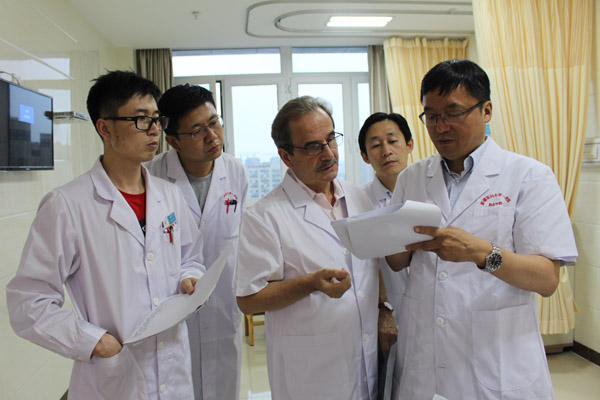Dreamers and doers


Wen, then pursuing his doctorate in Britain, got to know about the technique from an international conference booklet in 1991 and the year after, receiving his degree, he went to the medical center at Besancon for further surgical training on liver transplantation.
"I studied there for one year as a visiting scholar, and then a few years later as a guest professor. The experience laid a solid foundation for my surgical innovation," says Wen.
Back in Xinjiang in late 1995, Wen started facilitating the international cooperation, and in 1997, Mantion and three of his colleagues were invited to China.
It was the first time since the reform and opening-up that a group of foreign surgeons had visited Xinjiang.
Speaking about Mantion, Wen says he is a highly sophisticated surgeon.
"Observing and learning from him is like watching a work of art," says Wen.
Mantion, now in his 70s, regularly takes part in meetings for doctors to discuss therapeutic regimens for complicated cases, during every visit to Xinjiang.
"Younger doctors would like to stress on techniques, but he is more considerate to the patients," Wen says.
During the past 21 years, Mantion has seen Xinjiang's leapfrog in developing medical care.
And he says: "They still ask me, but I believe they can do it by themselves. This was not the case 20 years ago."
One of the key developments happened in 2010, when Wen's team managed the world's first liver autotransplantation for treating an end-staged AE patient, during which the patient's whole liver was taken out, dissected, repaired and reimplanted.
It is now eight years since the surgery, and the patient is still alive.
According to Wen, 78 of the approximately 150 cases of liver autotransplantation worldwide were done in Xinjiang.
When Wen's team reported the first case in the English version of the Chinese Medical Journal, Mantion, in his editor's note, wrote: "We dreamed of it; they did it!"
Speaking about the achievement, Wen says: "We move forward by standing on the shoulders of our predecessors.
"He (Mantion) hopes to apply the technique back in France, and two cases are being discussed. Whether they come or we go there, we are working on it."
Mantion says he is proud that Chinese surgeons have grown from devout students to leaders in the field.
"When you are an academic surgeon and professor, you may do big things. But most important as a teacher is to help the younger generation accomplish more and be proud of them," he says.




































